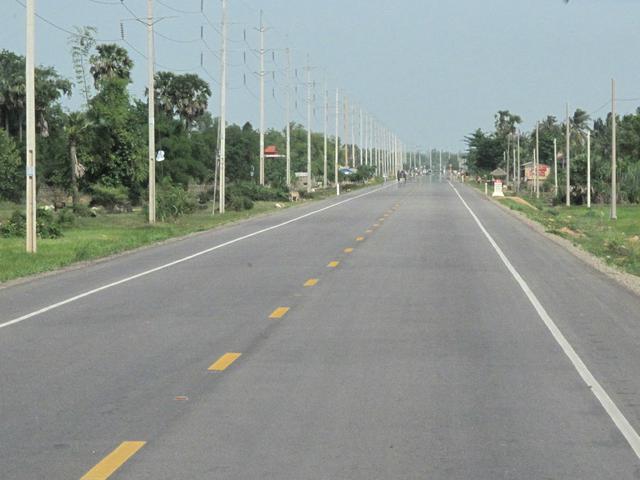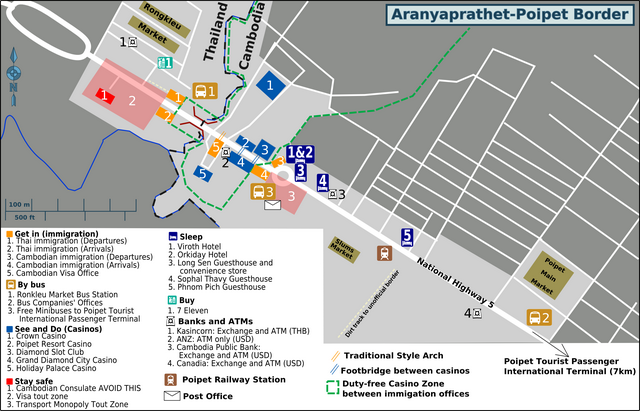 Poipet hosts Cambodia's main border crossing with Thailand, which links northwest Cambodia to Aranyaprathet, and hence Bangkok. Cross-border activity has made the town grow to be larger than its provincial capital, Sisophon.
Poipet hosts Cambodia's main border crossing with Thailand, which links northwest Cambodia to Aranyaprathet, and hence Bangkok. Cross-border activity has made the town grow to be larger than its provincial capital, Sisophon.
Poipet is on the fully paved National Hwy 5 which runs to Sisophon and then further on the south side of the Tonle Sap Lake to Battambang and Phnom Penh. At Sisophon, National Hwy 6 branches off to provide a fully paved arterial route along the north of the Tonle Sap to Siem Reap and Phnom Penh.

In the view of most travellers "a dump", Poipet hosts a bewildering array of touts, beggars, thieves and dodgy casinos for day tripping Thais, which all contrive to separate money from the unwary. The town has one main street that runs approximately southeast from the roundabout at the immigration offices. North of this street is an average Cambodian town; to the south is a poorer slum area. Both areas have their own markets: clean and airy and dishevelled and stinking, respectively. The latter is likely to be more interesting to an observer. For travellers staying overnight at the border, Poipet represents a cheaper option than the adjacent Thai town, Aranyaprathet, particularly for those heading into Cambodia (see below for avoiding overpriced transport).
While most travellers only pass through, the town can provide the savvy and curious with some fascinating insights into Cambodia's grisly underside. Ever a transport hub, Poipet hosts the western railhead of Cambodia's defunct, but regenerating network which once connected to the functioning Thai network.
The nearest Thai town is Aranyaprathet, about 6 km from the border. The border is in central Poipet. The border is open 07:00-20:00. There is no time difference between Cambodia and Thailand.
Immediately next to the Thai immigration facilities is Rongkleu Market, which host banks, cafes, a convenience store, money exchangers, and buses.
Poipet is a border town typical of where shocking economic disparities exist between two nations, not unlike Tijuana or Ciudad del Este or less famously, impoverished Sungai Kolok in southern Thailand, which borders more prosperous Malaysia. The town offer the usual Khmer mix of markets, stalls, coffee shops and beer gardens.
Poipet's growing gambling industry has spawned several large, opulent casinos, in rather sharp contrast to general squalor of the town. Gambling is illegal in Thailand and in Cambodia, though this has not prevented some well connected somebodies from putting up casinos before Cambodian immigration. Thais use the casinos to circumvent their own country's interdictions, though Khmer are not allowed at the tables.
The amateur anthropologist can watch Asian businessmen entertain themselves at the casinos or at the karaoke bars throughout town that double as brothels. Watching the coachloads of package tourists being shepherded through customs may also count as a valid pastime.
It is a near certainty that the casino operation is run by organised crime. Given that you may want to think twice before giving them your money.
The area around the old railway station is particularly interesting. This slum backs onto the filthy trickle of a river that marks the Thailand-Cambodia border and at around dusk tuk-tuks brimming with people can be seen making their way to the unofficial border crossing, an unstable bamboo bridge 400 m down the dirt track south from the railway station. The path passes a small Cambodian police station. The Thai side is a minefield, but the well-trodden path can be followed and leads to a road. Being stopped at a Thai police checkpoint once on the road is likely. Using this unofficial border crossing, apart from perhaps a few paces on the Thai side for bragging rights, will likely cause problems for conventional travellers, particularly upon their exit from Thailand. This option should only be used in the most extreme circumstances that preclude the town's regular border crossing.
People with a desire to help others can find opportunities in Poipet. Any assistance or conscious effort to speak Khmer or interact with local people on their own level will be highly appreciated. A man called Trip (+855 77945100) is a friendly English speaker. He will act as a guide to Poipet and tell you some interesting stories about the area. Cost: buying him lunch and a beer.
In Rongkleu Market, just before Thai immigration, banks sell USD at decent rates (USD being the main currency of Cambodia). There are also ATMs dispensing baht. For exchange, the banks don't open until 10:00, and after a weekend or holiday they may be short on USD. Do not worry, baht can be exchanged in Cambodia without problem, some large stores even accept baht at rates better than they do Cambodia's own toy currency, the riel.
In Poipet, just about anyone will exchange USD and baht to riel. Look for the traders with glass cabinets full of money, it's their way of advertising. There are banks and ATMs close to the border but Canadia Bank is a little further away. ANZ charges USD5. Canadia ATMs charge a $4 service charge to nearly all ATM cards issued by foreign banking institutions - some bank cards from Europe are the only exception to this policy (June 2015).
If you're a sucker for the minibus to the Poipet Tourist International Terminal, you'll probably also be a sucker for the expensive snacks next to where it departs.
Very close to immigration, on the north side of the roundabout, Long Sen Guesthouse has a convenience store. In front of the post office is a little street stall does reasonable meals and coffee and doesn't rip off tourists, which is a pleasant break from the border stress.
In the duty-free zone, in front of the Poipet Resort Casino is a laid back coffee shop and cafe. Also, some of the casinos offer buffets. Though they have dress codes, so you may have to spruce up a bit. Holiday Palace and Diamond serve good coffee and even frappes and have air conditioning, although in Diamond you need to explore a bit to find it, an interesting experience in itself. Food in the casinos is good and a welcome change from the standard restaurants in town.
Beyond the immediate border area, the markets probably offer the most atmospheric dining. Also Capitol Restaurant (2 km from the border) has air-con. Meals cost USD2-4.
Like most of Southeast Asia, unprovoked violent crime is not rife. However, being foreign and out at night could be construed as sufficient provocation. During the day, one can wander through the town and its slums without fear of a beating. Being robbed more subtly via scams and pickpockets is a different matter. Any visitor should explore Poipet with the expectation of spending more than reasonable and also of losing the contents of his pockets. Wear a money belt and stand your ground if you think you are being scammed. Watch out for pickpockets and snatch thieves, including the adorable little children who swarm you and cheer at the border. If you've managed to arrange a taxi away from the monopoly, don't pay up front, and do not let anybody you don't know into the car. The small upside to the travel monopoly is that, once the exorbitant price for the taxi has been paid, they're reliable and the driver will take you anywhere you like once you've reached your destination.
On the south side of the roundabout, in front of the cluster of radio masts, is a post office. Postcards not available but it's your last chance to get a Cambodian stamp on those Angkor postcards.
- Phnom Penh - 8 to 10 hours by bus.
[[Phnom Penh]] - 8 to 10 hours by bus.
